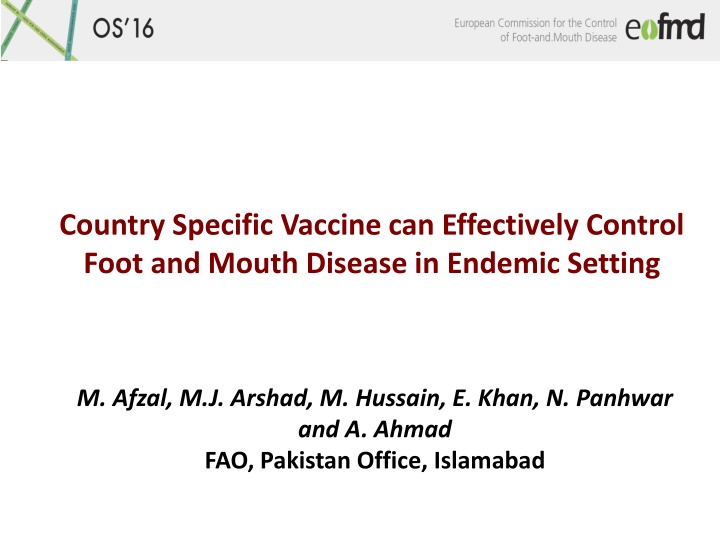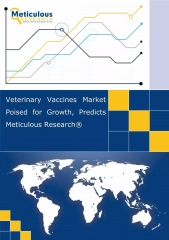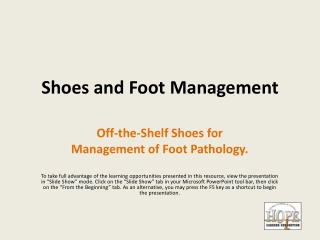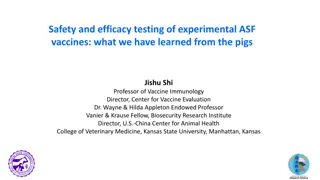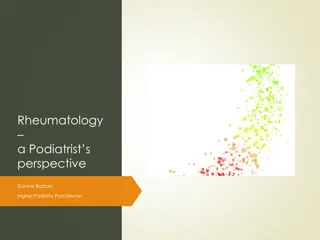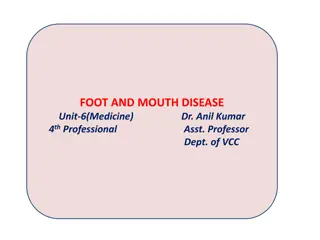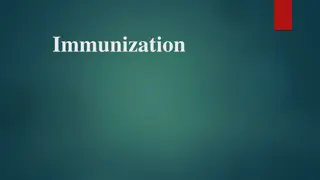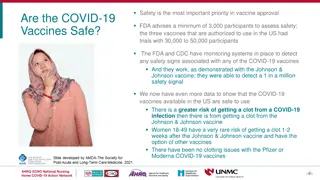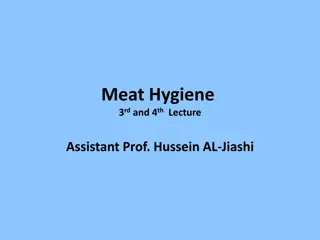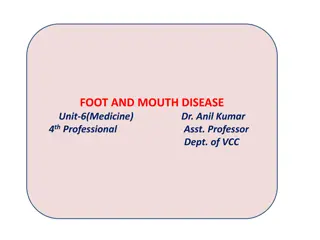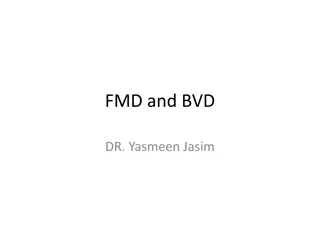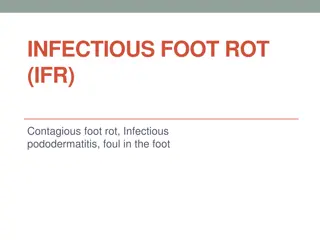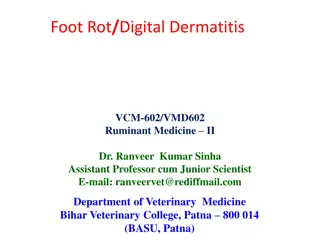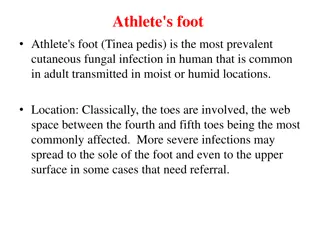Developing Country-Specific Vaccines for Foot and Mouth Disease Control in Pakistan
In Pakistan, Foot and Mouth Disease (FMD) vaccination plays a crucial role in protecting animals, but challenges with locally manufactured and imported vaccines have hindered effectiveness. To address this, the development of country-specific FMD vaccines tailored to circulating virus strains has been undertaken, aiming to enhance vaccine quality, matching, storage, and delivery. Specific vaccination efforts in dairy colonies like Khalsa area in Peshawar and other regions are highlighted to improve FMD control in endemic settings.
Download Presentation

Please find below an Image/Link to download the presentation.
The content on the website is provided AS IS for your information and personal use only. It may not be sold, licensed, or shared on other websites without obtaining consent from the author.If you encounter any issues during the download, it is possible that the publisher has removed the file from their server.
You are allowed to download the files provided on this website for personal or commercial use, subject to the condition that they are used lawfully. All files are the property of their respective owners.
The content on the website is provided AS IS for your information and personal use only. It may not be sold, licensed, or shared on other websites without obtaining consent from the author.
E N D
Presentation Transcript
Country Specific Vaccine can Effectively Control Foot and Mouth Disease in Endemic Setting M. Afzal, M.J. Arshad, M. Hussain, E. Khan, N. Panhwar and A. Ahmad FAO, Pakistan Office, Islamabad
FMD Vaccination in Pakistan Vaccination is an important tool for protecting animals against FMD Vaccination coverage is < 5% in Pakistan (cattle and buffalo population around 80 million) Besides quantity of the vaccine, quality is the major issue Frequent outbreaks of FMD were reported in animals even after vaccination Locally manufactured FMD vaccines issues with antigenic mass and quality control Imported FMD vaccines concerns with presence of strains not able to protect circulating FMD viruses Informally available FMD vaccines Mostly smuggled into the country without any cold chain Farmers seriously doubt that vaccination can provide protection in their animals
Development of country specific FMD vaccine Most of the FMD outbreaks (>8000 from 2012-2016) captured by the veterinary service and tissue samples collected Circulating FMD virus strains identified and genotyped at National Veterinary Labs, World Reference Laboratory and Plum Island Animal Disease Research Centre Vaccine matching studies undertaken ((NVL, WRL and PIADRC) Vaccine specially got manufactured from an international institution Vaccine storage and delivery to the field ensured under cool chain
FMD Vaccines used in Pakistan Vaccine 2012 Serotype O PanAsia- 2 Serotype A Iran 05 Serotype Asia-1 Shamir Concentration of all strains in the vaccine > 6 PD50 Vaccine 2013 2014 Serotype O PanAsia-2 Serotype A Turkey 06 Serotype Asia-1 Sind 08 Concentration of all strains in the vaccine > 6 PD50 Vaccine 2015-16 Serotype O - PanAsia-2 (>6 PD50) Serotype A Kabardino- Balkaria-2013 (>10 PD50) Serotype Asia-1 - Sind 08 (>6 PD50 )
Vaccination in dairy colonies Animals # Dairy Colony Farms (#) Initial New Total Khalsa area Peshawar 330 10000 17983 27983 Landhi, Karachi 27 6360 24736 31096 Nagori Society, Karachi 28 4757 13475 18232 Rakh Chandra Rai Lahore 183 7014 13874 20888 Eastern bypass, Quetta 16 3927 6463 10390 Quary Road, Quetta 33 7567 7136 14703 Livestock farms, Mirpur 30 945 811 1756 Dairy Farms, Islamabad 309 6529 1790 8319 Total 956 47099 86268 133367
Vaccination in Smallholders Rural Production System Province / Region (# Districts) Villages (#) Farmers (#) Vaccinated Animals (#) Initial New Total Punjab (3) 12 2424 16203 2818 19021 Sindh (4) 49 2164 14895 250 15145 Khyber Pakhtunkhwa (3) 15 2407 13887 5752 19639 Balochistan (3) 14 931 9255 2921 12176 Fed Admn Tribal Areas (3) 12 2487 10833 11071 21904 Gilgit-Baltistan (3) 12 2672 15105 - 15105 Azad Jammu & Kashmir (3) 31 6058 10805 4731 15536 Total (22) 145 19143 90983 27543 118526
Vaccination at Rural Breeding Farms Province Farms # Animal # Punjab 18 8890 Sindh 5 1064 Khyber Pakhtunkhwa 5 735 Total 28 10689 No case of FMD recorded in vaccinated animals
FMD Vaccination in Desert Cattle Farming S. No. Field Team Tobas (#) Total Primary vaccination Booster dose 6 months after booster population 1 Channanpir 36 10,655 1,793 1,864 1,811 2 Jugaitpir 30 7,651 1,221 1,000 999 3 148-DB 34 10,400 1,486 1,476 1,390 4 Head Farid 16 8,040 2,000 1,795 1,540 5 Qila Darawar 15 7,530 1,000 982 880 Total 131 44,276 7,500 7,117 6,620
Post-vaccination sero-monitoring on Day 30 Production System Tested sera (#) Animals (%) with protective ELISA antibody titres against SP Serotype O Serotype A Serotype Asia-1 Dairy colonies 2333 90.1 88.3 86.5 Smallholder rural 760 82.0 80.1 83.9 Rural Breeding Farms 171 80.6 79.8 72.8 Desert Cattle Farming 286 77.3 80.7 61.9
FMD Vaccination in Yaks Yak are special to high mountain areas and are important source of livelihood. No information on FMD in yaks in Pakistan Blood samples taken from yaks were positive for FMD-NSP antibodies [66 out of 136 (48.5 %)] before vaccination Vaccination trial undertaken in Ghizer district (9 villages) in Feb 2012 in 4324 yaks FMD outbreak (approx 2000 yaks affected with serotype A) recorded in July 2013 in Nala Khukhush in district Ghizer in unvaccinated animals No clinical case recorded in vaccinated animals Analysis of serum samples collected from vaccinated animals shows good antibody response in yaks. Average ELISA PI values for antibodies against SP are shown below (n=87) Serotype Day 0 Day 30 Day 210 O 39 84 89 A 42 74 87 Asia-1 44 65 82
Vaccination on Cost Sharing Basis(Up to Sept 2016) Province / Region Farms (#) Vaccinated Animals (#) Punjab 571 83,904 Sindh 1403 266,102 Khyber Pakhtunkhwa 13 550 Balochistan 76 6,765 Azad Jammu & Kashmir 1013 23,700 Islamabad Capital Territory 17 725 Total 3093 381,746
Conclusions In endemic setting, characterization of circulating viruses and their vaccine matching studies can help to develop country specific FMD vaccine Country specific FMD vaccine can provide good protection in endemic setting For first timers (calves and adults), always ensure booster vaccination after 3 to 4 weeks of primary dose Calves may be vaccinated at 3 months of age Maintain cool chain during vaccine storage and field use
Acknowledgements Excellent support of all livestock departments particularly field veterinarians for the implementation of project activities FMD-WRL UK for sub-typing and vaccine matching PIADRC, New York for collaboration in genotyping and vaccine matching Support of AHC Office and NVL All stakeholders particularly livestock farmers USDA for financial assistance
Thank you! http://www.fao.org/pakistan http://www.fao.org/pakistan
